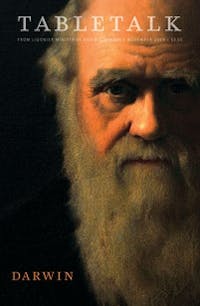
Request your free, three-month trial to Tabletalk magazine. You’ll receive the print issue monthly and gain immediate digital access to decades of archives. This trial is risk-free. No credit card required.
Try Tabletalk NowAlready receive Tabletalk magazine every month?
Verify your email address to gain unlimited access.
The door opened and a middle-aged man appeared. “Hi, I’m from the local church and….” “Don’t waste your time,” he interrupted, “I’ve no time for religion, I believe in science.” “Really? Are you a scientist?” “No.” “Have you studied science?” “No.” “So why do you have faith in science?” Silence.
The conversation is an all too typical consequence of a modern Western myth that science and religion are polar opposites and that those who have a scientific background and knowledge will de facto avoid faith. In the mid-nineteenth century science was largely dominated by “amateurs,” including many clergymen. After the appearance of Darwin’s Origin of Species some people (though not Darwin himself) saw an opportunity to use “science” as a weapon against religion. From the days of Thomas Huxley until the modern day atheist “Four Horsemen of the Apocalypse” (Dawkins, Hitchens, Dennett and Harris), the myth has been carefully nurtured that Christianity and science are fundamentally opposed. Sadly, some Christians have bought into this myth and have helped foster the perceived science/religion divide. As a result, there are many people who unthinkingly accept this myth and, in a classic case of what Tim Keller would rightly call a “defeater” belief, they do not even consider the gospel. It is a scenario I come across often in pastoral and outreach work; so, how do we deal with it?
First, at a practical level, I introduce people to the many scientists who are in my congregation. As a city congregation with a substantial student population, we are blessed with many students who study science, and many people whose jobs are science-based. We even have several post-doctoral research scientists who are at the top of their respective fields. If science and religion are opposed, then why are these scientists to be found every Sunday worshiping Jesus? The response that Dawkins and others will give is that they are simply “compartmentalizing.” In other words, they know that their science and faith cannot be reconciled and so they just put them in different compartments. Our atheist friends come to this conclusion, not because they ask or have any evidence for this, but because they have to. They start with the conclusion and try to make the facts fit into their predetermined viewpoint. But as good Calvinists we are not allowed to compartmentalize. We affirm with Kuyper that there is not one inch of the universe of which Christ does not say, “It is mine.” We do all things for the glory of God — including science. And that is why we encourage those believers who have the interest and the abilities to be involved in science as a God-given calling.
Second, I point people to the history of science and to the impossibility of there being any modern science without theistic and, indeed, Christian presuppositions. The original founders of the Royal Society in London were basically puritans who believed, along with Newton, that there were two books of the revelation of God — creation and the Bible. All modern science is based upon the notion that the universe is ordered and can be studied. This is so often assumed that people forget that the assumption itself is a belief that is founded upon a monotheistic view of the universe. The ancient Greeks believed in many gods operating in a chaotic universe. The Christian believes that God brought order out of the chaos and therefore that that order can be studied. This is the philosophical basis of all modern science, without which it could not exist.
Then I look at the current state of science. Recent scientific discoveries have once again demonstrated the glory of God in the heavens. Perhaps the greatest example of this is the discovery of the fine-tuning of the universe. The consequences of this are phenomenal — either one believes that we are incredibly “lucky” or that someone designed our designed universe, or, if you are really desperate to avoid God, you invent the “multiverse theory,” which speculates, without any empirical evidence, that the universe is one of billions of universes that just happens to provide the fine-tuning for life.
Finally, I would point out that it is the philosophy of scientism rather than the practice of science that is the problem. The philosophy of scientism, that only the material exists, is anti-Christian and, ironically, it is also anti-scientific because it is not an empirically provable scientific theory. The Bible is not a scientific textbook and it would be foolish to look for things to prove in the Bible from science (as though the Bible were subject to our current limited understanding). But the presuppositions and teachings of the Bible are, as we would expect them to be, completely compatible with the practice and knowledge of science. As John Lennox from Oxford University points out in his wonderful God’s Undertaker: Has Science Buried God?: “Far from science having buried God, not only do the results of science point towards his existence, but the scientific enterprise is validated by his existence. Inevitably, of course, not only those of us who do science, but all of us, have to choose the presupposition with which we start. There are not many options — essentially just two. Either human intelligence ultimately owes its origin to mindless matter; or there is a Creator. It is strange that some people claim that it is their intelligence that leads them to prefer the first to the second.”
